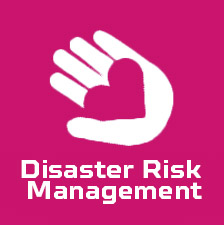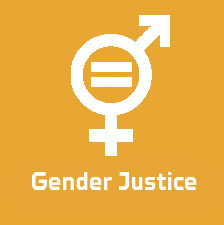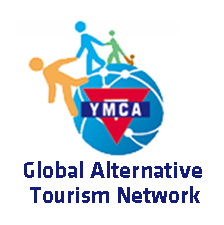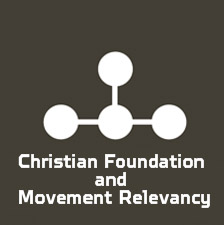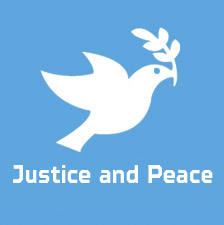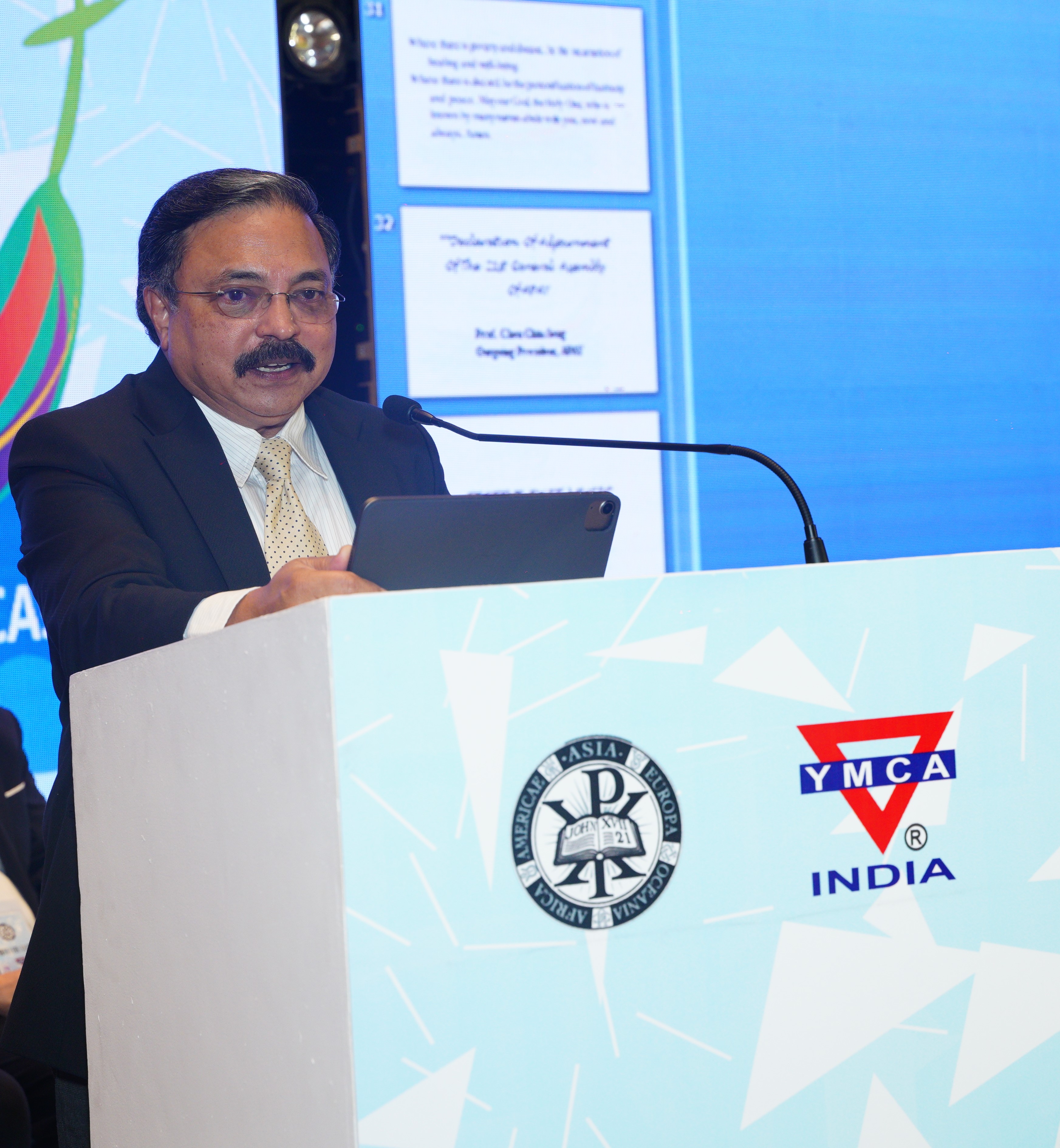YMCA Korea is developing youth climate leadership through the Raonatti Project
Last Updated (Tuesday, 30 November 1999 08:00)

(Raonatti participants making friends with youths in Chiangmai, Thailand)
Raonatti means friend in Korean language.
Raonatti program (Raonatti) is an Asian youth leadership program that the National Council of YMCAs of Korea (NCYK) has continued for 15 years under the sponsorship of KB Kookmin Bank. The main goal of the Raonatti is facilitating Asian youth to dream of a sustainable future together through the process of becoming friends with each other. Raonatti is based on cooperation with various YMCAs in Asia. NCYK trains Korean youth and sends them to YMCAs in Asia (a total of 11 countries in the Asia and Pacific Alliance of YMCAs have joined so far) to carry out projects for sustainable Asia, including volunteer work and educational activities with local youths.

(Planting trees with local children in Malang, Indonesia)
Two thousand seven hundred trees were planted in 2023.
Raonatti stopped sending Korean youths due to COVID-19 and resumed its activities in 2023. After COVID-19, Raonatti has been renewed as a three-week program with local YMCAs of four countries (Cambodia, Indonesia, Thailand, and Vietnam) under the theme 'Sustainable Asia, Youth Climate Leadership.' Thirty-six Korean youths were trained in Korea based on climate crisis, human rights, and SDGs, and they were sent to four countries last January. A total of 2700 trees were planted with the local YMCAs for these three weeks.
Tree planting is the easiest and most effective way for carbon absorption. The most important thing about tree planting is that there should be a system for caring for trees planted by local communities. Trees that are not cared for by anyone eventually die, and such activities will not be of any help to the sustainable earth. To this end, the NCYK received advice from the Executive Director of Green Asia Network, Oh Ki-chul, who received the first prize of the U.N. Land for Life Award for making forests with Mongolian communities. Oh emphasized that planting trees that are not beneficial to the local community is meaningless and not sustainable based on his 30-year experience.

(Planting trees with local communities in Chiangmai, Thailand)
To apply this principle, the local YMCAs in four countries put in a lot of effort. The local YMCAs have connected and communicated with local communities to ensure that trees can be planted in places where local communities will take the follow-up management. In addition, they contacted local government offices and schools so that trees could be planted in public places and that each institution could take care of them. Educational programs to teach local children about the importance and enjoyment of planting trees through planting together with the participants were designed, too. (Educated 520 children in 2023)
Civil solidarity and international cooperation are sustainable solutions to the climate crisis.
In addition to planting trees, the participants carried out various campaigns and educational activities. In connection with a local university, VietnamYMCA helped participants to conduct a campaign in the campus area. The campaign was to exchange plastics for flower pots. The Cambodia YMCA provided an opportunity to repair a daycare center for poor children in the region. Through a street campaign with the MalangYMCA in Indonesia, the participants introduced the seriousness of the climate crisis and the importance of planting trees. The Chiangmai YMCA in Thailand provided an opportunity for participants to conduct energy-saving education and campaigns for children in local schools.

(Street Campaign in Malang, Indonesia)
As the participants planned and conducted climate crisis campaigns in Asia by themselves, they came to think deeply about the concept of sustainability. The climate crisis is a huge problem that can only be overcome through solidarity and cooperation among global citizens. However, personal learning and personal efforts to solve the climate crisis are still prevalent in Asian countries. Through their first-hand experience of this reality, they learned that international cooperation and education to reduce carbon and the youth leadership to lead the way are essential.

(Climate campaign with local youths in one local University in Hochiminh city, Vietnam)
Meeting people is a sustainable international solidarity.
The beginning and the end of solidarity is to become friends. The participants talked a lot about the friendships they shared with the staff members of the YMCAs, youths, and the local community. Planting many trees was good, but the experience of making friends with strangers in an unfamiliar environment was more inspiring and exciting than anything else. From now on, the participants will be worried about the Chiangmai YMCA staff members if something happens in Thailand. They will expect to meet the Malang YMCA youths again at APAY events. They will be more interested in the Vietnamese government's climate crisis policy and they will pray that Cambodia will not suffer from a disaster caused by the climate crisis.
Three weeks is a short time to respond to the climate crisis. However, the main goal of the program is to inspire youths to imagine a sustainable Asia and a sustainable earth through making and taking care of their friends in the YMCA international networks. In fact, several participants are planning follow-up programs by themselves, and the NCYK will support their plan. Since the Raonatti is annual program, NCYK will strive to develop a sustainable international cooperation model and a youth climate leadership model with our YMCA friends.
Words from the participants
Junmo Gu – sent to Thailand
Humans are making the earth sick by destroying the environment, and discrimination and hatred between humans have divided the world. Many suffer from war, disease and poverty. I came to think that technology and institution are not the problem, but people. At the same time the solution is people too. Raonatti enhanced my understanding of people and made me work with people for the same goal.
Naeun Hyun - sent to Vietnam
Through this program, I was able to realize my dream of volunteering abroad and lay the groundwork for a better self and a better future. The beautiful scenery of Vietnam, the rich culture, and the precious relationship with the Vietnam YMCA staff members and volunteers gave me unforgettable memories.
Ayeon Lee - sent to Thailand
I think Laonatti has more values than just volunteerism. Living in other country, I can truly understand the nature of the local culture, communicate with the local youths, and feel more colorful emotions. I could realize that more meaningful experiences than I could imagine were unfolding in front of me. I really tried to spend each day meaningfully.
Eun-ju Lee – sent to Cambodia
The YMCA staff members who helped us, the children and teachers at the day care center, the people I met while farming in the community, the college students I met while exchanging culture, the students and teachers of elementary school, and the people I met over the long journey all embraced me with warm warmth. I felt great gratitude for them, and I also want to return the affection I received from them when I came back to Cambodia.

(Playing with a child at the YMCA Day-care center at the Siem Reap, Cambodia)
By Da-eun Yang, NCY of Korea
EarthHour2EarthDay Climate Action Challenge 2024
Last Updated (Tuesday, 30 November 1999 08:00)
The 2024 Climate Action Challenge is scheduled to begin on March 23, 2024 and will continue until April 22, 2024. It will comprise of 30 challenges spread over 31 days. We urge you to mark your calendars and start preparing for this marathon climate action challenge!
We have planned a wide range of daily challenges for this exciting journey!
Get ready to make a difference, and join us in this impactful initiative!
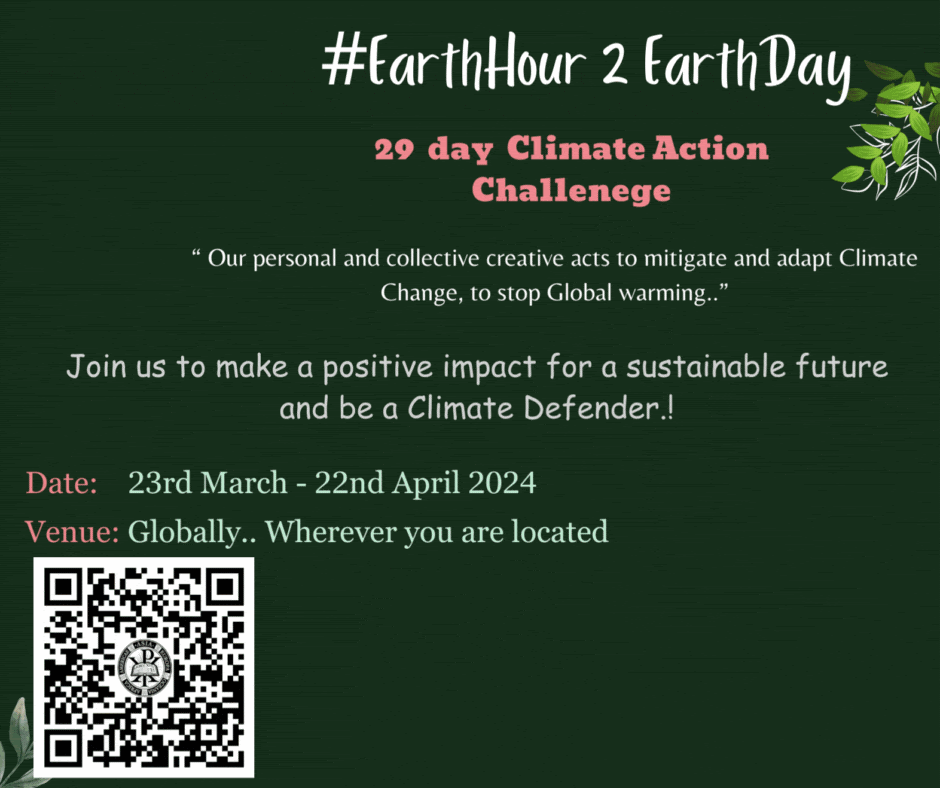
"What are the plans for the 2024 Climate Action Challenge?"
- The challenge commences with Earth Hour on the 23rd of March 2024. Let's unite and turn off our lights for one hour, from 8:30 PM to 9:30 PM, to show our commitment to a sustainable future.
- Throughout the 31 days, we will engage in various activities aimed at promoting environmental awareness and action based on the weekly theme:
- Attention campaign participants! Our final challenge will be a big clean-up event on Earth Day. The event is aligned with this year's theme, "Planet vs Plastic", and aims to collect and recycle plastics. The clean-up event will take place on either 20th or 21st April 2024, so please start planning accordingly. Remember to take photos and record the weight of all the plastics you collect during the event. We will tabulate the total weight of all the plastics collected on the final day, which is 22nd April 2024.
Please scan the QR code to sign up for the campaign.
Get ready to make a difference and be a part of something amazing! Together, let's show our planet some love. Stay tuned for more updates and further details. Thank you for your participation!
Workshop on cybersecurity by YMCA Pakistan
Last Updated (Tuesday, 30 November 1999 08:00)
The virtual world can sometimes prove to be a trap for young people, often targeted by malicious elements with nefarious designs. There is a need to be aware of such elements and blackmailers.
The Lahore YMCA, keeping up with the tradition of staying abreast of the latest developments, held a training workshop for young people to equip them with skills regarding cyber security. The workshop called 'Cyber Friday' was held at the YMCA Hall on Friday, attracting a large number of students from different institutions. The one-day workshop was also attended by leaders in different fields.

The workshop trained the participants on how to avoid being exploited on social media and explained to them tools for ensuring cyber security. The workshop practically trained the participants on how to safeguard themselves from issues related to cyber security.
Director, Lahore YMCA Haroon Rehmat was the chief guest on the occasion, and he, along with Emanuel Sarfraz, the General Secretary of YMCA gave certificates to the participants at the conclusion of the workshop. "YMCA will continue to hold such programs for the welfare of communities, and hopefully people benefiting from them will be able to safeguard themselves in challenging times," Rehmat said.
By Emanuel Sarfraz, General Secretary of YMCA Pakistan
Pink Shirt Day Campaign 2024 of Japan YMCA
Last Updated (Tuesday, 30 November 1999 08:00)
In solidarity with the global anti-bullying movement, Pink Shirt Day, Japan YMCA is promoting this initiative throughout all local movements. The last day of every February is marked as YMCA Pink Shirt Day, which this year is 29 February.
In February 2007, a boy who wore a pink shirt to school was bullied for being a homosexual. Two senior students heard about this, and then they bought 50 pink shirts and called on the internet to wear pink shirts to school together tomorrow. The next day, hundreds of students who agreed with the call wore pink shirts and accessories to school. The whole school turned pink, and bullying naturally stopped. The episode spread to more than 70 countries via social networking and other media, and last Wednesday in February, when the event took place in Canada, became known as Pink Shirt Day, a day to think about bullying and show solidarity with those being bullied.

The campaign aims to make bullying a 'personal issue' for society as a whole and to create a society where everyone can live safely and accept diversity rather than discrimination, prejudice and division, in this Covid-19 disaster.
In Japan, each local movements hold speakers to discuss bullying and take action to show solidarity with those who are in a difficult situation due to bullying. Please see our Facebook page for more information.
https://www.facebook.com/japanymcapinkshirtday
We hope that as many people as possible will participate in this Pink Shirt Day campaign.
If you would like to join us in this campaign, please send a photo of yourself wearing a pink shirt or some other item to the National Council of YMCAs of Japan ( This e-mail address is being protected from spambots. You need JavaScript enabled to view it ). We will share it on our website. Or you can post it on your YMCA's social networking sites with #YMCAPINK.
By Utako Sugino, NCY of Japan
Pursuing and Embracing Justice: Insights from Isaiah 1:16-18 Biblical-Theological Reflections by Rev. Dr. Samuel D. Stephens
Last Updated (Tuesday, 30 November 1999 08:00)
Introduction
Historical Context and Background: During the time of Isaiah's writing, the nation of Judah was in a state of moral decay. The people had strayed from the path of righteousness, engaging in empty religious rituals while neglecting the core principles of justice and compassion. The book of Isaiah addresses this spiritual decline and calls the people to genuine repentance and transformation.
Isaiah 1:16-18 captures a divine plea for the people to turn away from their superficial practices and instead actively pursue justice, reflecting the heart of a just and righteous God.
As we reflect on Isaiah 1:16-18, let's consider its relevance within our unique Asian context. Much like in Isaiah's time, our communities face challenges of inequality, and it's crucial that we understand the role of justice in our YMCA mission. This passage echoes God's call to His people for genuine transformation and justice in their lives.
A JUST WORLD
The concept of a "just world" can be multifaceted, depending on the viewpoint from which it is considered. Below, I'll explore this idea from the standpoint of a YMCA leader,
As a YMCA Leader:
1. Equitable Access to Opportunities: A just world, from a YMCA leader's standpoint, would be one where everyone, regardless of their background, has equal access to opportunities for growth and well-being. This involves ensuring that facilities, programs, and educational resources are available to all, irrespective of socioeconomic status, race, or gender. Rather than mere equality, equity becomes the focus—providing people what they need to succeed rather than giving everyone the same thing.
2. Community Empowerment: A YMCA leader might also define a just world as one where communities are empowered to make decisions that affect them directly. This could involve participatory programs that give a voice to the marginalized and seek to redress imbalances of power. By providing platforms for open dialogue and decision-making, a YMCA leader aims to create a world where justice flows through the veins of community action.
3. Holistic Well-being: YMCA programs often aim at the well-rounded development of individuals—physical, emotional, and intellectual. A just world in this context would be one where the systems and institutions that govern society are geared towards fostering this holistic well-being, focusing on both individual and communal health. This includes not only physical fitness but also emotional and psychological support systems, educational opportunities, and community-building activities.
I. A Call for Personal Transformation:
Isaiah 1:16-18 begins by calling for personal transformation: "Wash and make yourselves clean. Take your evil deeds out of my sight; stop doing wrong. Learn to do right; seek justice." This call emphasizes that genuine justice begins with individual change. Dr. Martin Luther King Jr’s famous words , "True peace is not merely the absence of conflict; it is the presence of justice.
Isaiah's call for personal transformation rings true for us as Asian YMCA leaders. We understand that our role extends beyond organizational leadership; it involves personal commitment to transformation. In our diverse and vibrant Asian cultures, let us be examples of justice in action, showcasing how individual change can inspire our communities.
II. Seeking to create a Just World for us as YMCA leaders is to Reflect God's Heart in the Asia Pacific Context:
The passage highlights that God desires justice from His people because justice is integral to His character. The text continues, "Defend the oppressed. Take up the fatherless's cause; plead the widow's case." God's concern for the marginalized reflects His just and compassionate nature. As theologian Nicholas Wolterstorff stated, "Justice is love's distributive aspect." God's love compels Him to ensure that justice prevails for all, especially those who are vulnerable.
The call to "Defend the oppressed. Take up the cause of the fatherless; plead the case of the widow" holds particular relevance in our Asian societies. Our regions are marked by a rich tapestry of cultures and socioeconomic diversity., "Justice is an expression of God's love."
As YMCA leaders, we have the unique opportunity to reflect God's heart of compassion and fairness within our local contexts, ensuring that the marginalized are not left behind.
From a Unique Christian Perspective of God’s Heart:
1. Redemptive Justice: In a uniquely Christian worldview, a just world is one in which the principle of redemptive justice is practiced. This involves not just punitive measures for wrong actions but also offers avenues for redemption and reconciliation, much like the story of the Prodigal Son in the Bible. It focuses on the transformative power of love and forgiveness in restoring social harmony.
2. Servant Leadership: Taking cues from the example of Jesus Christ, a just world from a Christian perspective would be one led by servant leaders. These are individuals who prioritize the needs of the community over their own, serving rather than ruling. This form of leadership embodies Christ's teachings on humility and service, thus creating a social structure that values each individual’s worth.
3. Kingdom-Oriented Society: (a community under the Reign of God) - A just world in a Christian context would strive to reflect the 'Kingdom of God'—a place where the values of love, joy, peace, and justice are not just idealistic concepts but a lived reality. This involves aligning societal norms, laws, and cultural practices with the moral and ethical teachings found in the Bible, such as the Beatitudes and the Golden Rule ("Do unto others as you would have them do unto you").
Both from the YMCA leader's perspective and from a Christian point of view, the focus is on creating an inclusive, fair, and loving society, albeit achieved through different pathways and our foundational beliefs.
III. Hopeful Transformation and Renewal:
Isaiah 1:18 provides a message of hope: "Come now, let us settle the matter. Though your sins are like scarlet, they shall be as white as snow; though they are red as crimson, they shall be like wool." God's call to pursue justice is intertwined with the promise of transformation and forgiveness. This promise extends to both personal renewal and societal change. The theologian Reinhold Niebuhr asserted, "Man's capacity for justice makes democracy possible; but man's inclination to injustice makes democracy necessary."
Isaiah 1:18's promise of transformation and forgiveness speaks to the core of our Asian cultures, where values of restoration and renewal are deeply cherished. Our societies have faced historical challenges, and the words "though your sins are like scarlet, they shall be as white as snow" resonate with our collective yearning for positive change. As Asian YMCA leaders, let's weave this promise into our mission, offering hope to our communities by fostering a just and inclusive environment.
Application in the Asian Context and Relevance to YMCA Mission:
In our diverse Asian societies, where social structures can sometimes perpetuate inequality, Isaiah 1:16-18 serves as a guiding light for the YMCA mission. Our role as leaders is pivotal. We must strive for justice as an embodiment of our faith and our commitment to community building. By embracing justice within our cultural diversity, we align with the core values of the YMCA and contribute to a transformed Asia where all can thrive.
Conclusion:
Isaiah 1:16-18 serves as a poignant reminder that pursuing justice is not merely a social obligation but a spiritual imperative. In the historical context of Isaiah's writing, God's people were urged to embody justice as a reflection of their relationship with a just and righteous God. As we reflect on these verses, we are reminded that our pursuit of justice must begin with personal transformation, emulate God's character of compassion and fairness, and lead to the promise of renewal and forgiveness.
Dear Asian YMCA leaders, Isaiah's call to embrace justice is a spiritual and practical imperative.
Let us carry this message back to our diverse communities, weaving it into the fabric of our YMCA mission. Through personal transformation, reflecting God's heart, and embracing hopeful renewal, we can catalyze positive change that echoes through our nations, fostering a just and equitable Asia that is a testament to justice's transformative power.
Let us heed this divine call to seek justice, understanding that it is both an act of worship and a testament to our identity – THE YOUNG MENS CHRISTIAN ASSOCIATION as God's people – GOD’S HANDS AND FEET ON THIS EARTH.
Rev. Dr. Samuel D. Stephens is the former president of the Asia & Pacific Alliance of YMCAs. He is an Educator, Theologian, Missiologist, Community builder, and Global Leader.
The Biblical-Theological Reflection was delivered at the 21st General Assembly of the Asia & Pacific Alliance of YMCAs in Chennai, India - September 15-20, 2023
Read more...
- YMCA of Bangladesh celebrated its Golden Jubilee Logo Unveiling Ceremony & conducted a Property Management Workshop
- The Mission of the YMCA: Relevance and Challenges – Biblical Reflection and Response
- The Psalms: A Wellspring for a Sustainable Planet - Biblical Reflection on a Sustainable Planet
- Building Communities of Faith, Hope, and Love - Biblico-Theological Reflections
Page 2 of 40




